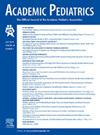An Untold Story: The Feelings of Pediatric Residents Early in the COVID-19 Pandemic and What They Can Teach Us Today
IF 3
3区 医学
Q1 PEDIATRICS
引用次数: 0
Abstract
Objective
To understand the feelings of pediatrics residents early in the COVID-19 pandemic and to offer insights still relevant today.
Methods
We performed a thematic analysis exploring resident feelings early in the pandemic using free-text responses on a national survey distributed between May and June 2020. We analyzed responses from the following multi-part free text question embedded in the larger survey, “Which of the following feelings have you experienced in your role as a pediatric resident during the COVID-19 pandemic” with response prompts including relief, guilt, pride, sadness, worry, fear, and other.
Results
While many feelings that respondents shared were common to society at large, some were specific to their intersecting roles as health care workers, pediatricians, and trainees. Some issues uncovered have continued relevance today including varied interactions with program and institutional leadership, training away from established support networks and during an important life stage, and societal concerns.
Conclusions
This study uncovered vulnerabilities inherent to being a trainee such as limited control over one’s own schedule or institutional policies and training away from established supports. Their feelings shine light on the moral distress experienced in residency and the role program and institutional leadership can play in the experiences of residents.
一个不为人知的故事:科威德-19 大流行初期儿科住院医师的感受及其对我们今天的启示。
目的了解 COVID-19 大流行早期儿科住院医师的感受,并提供对当今仍有意义的见解:我们利用 2020 年 5 月至 6 月间发布的一项全国性调查中的自由文本回复进行了专题分析,以探讨住院医师在大流行早期的感受。我们分析了嵌入在大型调查中的以下多部分自由文本问题的回答:"在 COVID-19 大流行期间,您作为儿科住院医师经历了以下哪些感受",回答提示包括缓解、内疚、自豪、悲伤、担忧、恐惧和其他:结果:虽然受访者分享的许多感受是整个社会共有的,但有些感受是他们作为医护人员、儿科医生和实习生的交叉角色所特有的。所发现的一些问题在今天仍然具有现实意义,包括与项目和机构领导的各种互动、远离已有的支持网络和在重要的人生阶段接受培训,以及社会关注的问题:本研究揭示了受训人员固有的弱点,如对自己的日程安排或机构政策的控制有限,以及在远离既定支持网络的情况下接受培训。他们的感受揭示了住院医师在实习期间所经历的道德困扰,以及项目和机构领导在住院医师经历中所扮演的角色。
本文章由计算机程序翻译,如有差异,请以英文原文为准。
求助全文
约1分钟内获得全文
求助全文
来源期刊

Academic Pediatrics
PEDIATRICS-
CiteScore
4.60
自引率
12.90%
发文量
300
审稿时长
60 days
期刊介绍:
Academic Pediatrics, the official journal of the Academic Pediatric Association, is a peer-reviewed publication whose purpose is to strengthen the research and educational base of academic general pediatrics. The journal provides leadership in pediatric education, research, patient care and advocacy. Content areas include pediatric education, emergency medicine, injury, abuse, behavioral pediatrics, holistic medicine, child health services and health policy,and the environment. The journal provides an active forum for the presentation of pediatric educational research in diverse settings, involving medical students, residents, fellows, and practicing professionals. The journal also emphasizes important research relating to the quality of child health care, health care policy, and the organization of child health services. It also includes systematic reviews of primary care interventions and important methodologic papers to aid research in child health and education.
 求助内容:
求助内容: 应助结果提醒方式:
应助结果提醒方式:


